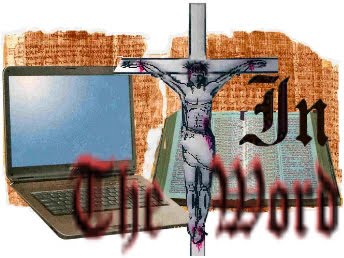TRUTH
DR. LEWIS SPERRY CHAFER IS THE FOUNDER OF DALLAS THEOLOGICAL SEMINARY--a very protigious higher level graduate school in in Conservative Christian thought.
He writes:
INSPIRATION
SYSTEMATIC THEOLOGY, VOLUME
I BIBLIOLOGY PP. 86-87, by Lewis Sperry
Chafer
DR. LEWIS SPERRY CHAFER IS THE FOUNDER OF DALLAS THEOLOGICAL SEMINARY--a very protigious higher level graduate school in in Conservative Christian thought.
He writes:
This does not necessarily imply correction of the earlier writings. It may be, as it is in the case of the Spirit, an adaptation of a truth to a new situation or setting. Every devout student will believe that, to a very considerable degree the preserving care of God has been over every worthy translation of the Scriptures and that in these translations no essential doctrinal val.ihas been sacrificed. |
At best, human understanding is imperfect. What may seem difficulty now-as has so often been demonstrated-is completely dissolved when all the facts are known. At this point archaeology has contributed much and will no doubt continue to do so to the end. The claim for verbal, plenary inspiration is made only for the original writings and does not extend to any transcriptions or translations. It is also true that no original manuscript is now available. Naturally, these facts give rise to the query whether the present existing translations-notably the text with which one is most familiar-is really trustworthy. This problem is worthy of serious consideration and has received the attention of the greatest textual critics in all generations of the church. But two passages of any considerable length are subject to dispute-Mark 16:9-20 and John 7:53-8:11. Of these two passages, the latter is more discredited than the former. As to textual difficulties generally, the following quotations are significant:
Westcott and Hort:
With regard to the great bulk of the words of the New Testament, as of most other ancient writings, there is no variation or other ground of doubt, and therefore no room for textual criticism; and here therefore an editor is merely a transcriber. The same may be said with substantial truth respecting those various readings which have never been received, and in all probability never will be received, into any printed text. The proportion of words virtually accepted on all hands as raised above doubt is very great, not less, on a rough computation, than seven-eighths of the whole. The remaining eighth, therefore, formed in great part by changes of order and other comparative trivialities, constitutes the whole area of criticism. If the principles followed in the present edition are sound, this area may be very greatly reduced. Recognizing to the full the duty of abstinence from peremptory decision in cases where the evidence leaves the judgment in suspense between two or more readings, we find that, setting aside differences of orthography, the words in our opinion still subject to doubt only make up one-sixtieth of the whole New Testament. In this second estimate the proportion of comparatively trivial variations is beyond measure larger than in the former; so that the amount of what can in any sense be called substantial variation is but a small fraction of the whole residuary variation, and can hardly form more than a thousandth part of the entire text.-The New Testament in Greek, II. 2, cited by Manly, Bible Doctrine of Inspiration, p. 223 |
Dr. Philip Schaff, chairman of the American Committee of the Revisers,
writes: "This multitude of various
readings of the Greek text need not puzzle or alarm any Christian. It is the
natural result of the great wealth of our documentary resources; it is a
testimony to the immense importance of the New Testament; it does not
affect, but it rather insures, the integrity of the text; and it is a useful
stimulus to study.
|

No comments:
Post a Comment